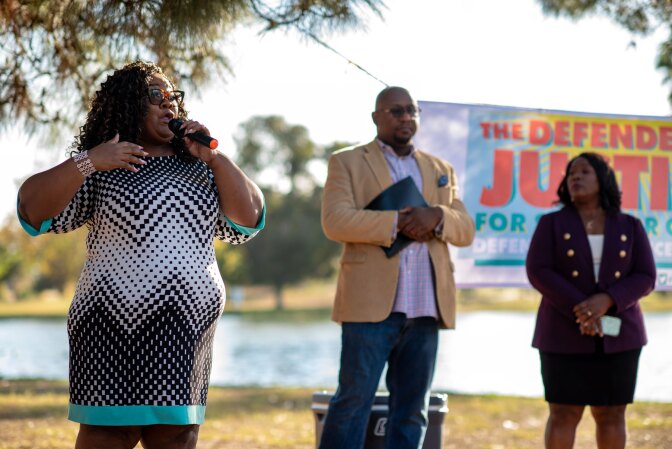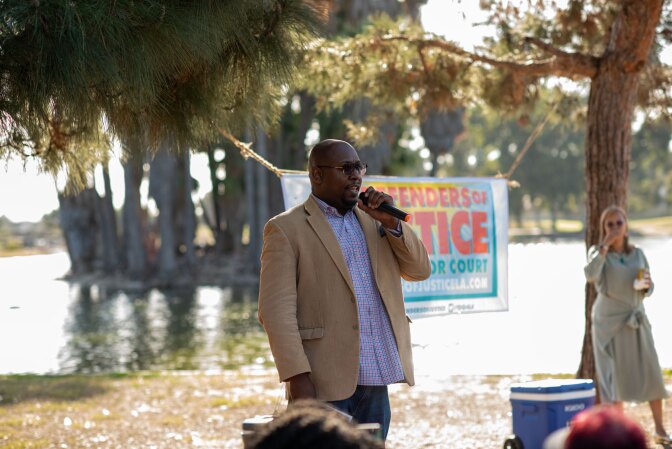This story is free to read because readers choose to support LAist. If you find value in independent local reporting, make a donation to power our newsroom today.
Why This Slate Of Judge Candidates Wants More Defense Attorneys Elected To The Superior Court

Over the last 25 years, Los Angeles County voters have elected just two people from the public defender's office to a Superior Court judge seat. But there’s a growing push toward getting more people with defense backgrounds on the bench.
This year, a slate of three defense attorneys calling themselves the “Defenders of Justice” is hoping to win seats on the bench. The candidates are: La Shae Henderson, George Turner and Ericka Wiley.
Historically, voters have overwhelmingly elected judges with prosecutorial experience. And although some California governors, including Gavin Newsom and Jerry Brown, have made it a point to appoint defense lawyers to judicial seats, the L.A. County Superior Court bench is comprised of many more former prosecutors.
Criminal justice reform advocates say judges with defense backgrounds — either public or private — can balance out the tough-on-crime rhetoric that has led to mass incarceration. And they say former defense attorneys can bring diversity to a bench that now has a range of alternatives to incarceration at its disposal.
'Defenders of Justice' candidates
As a deputy public defender for 18 years, La Shae Henderson said she’s seen how the criminal justice system touches lives, not just for the defendants, judges and lawyers, but also the families.
It’s part of the reason Henderson tried to bring a client’s full story into the courtroom, she said.
“This is a human being. This is a life. This is a person ... they’re struggling right now, give them a second chance,” said Henderson, who is now an adjunct professor at Pepperdine University and teaches juvenile rights.
She remembered a client who had been charged with a municipal code violation for selling oranges in front of a business. The client couldn’t afford to pay the fine and slipped her a written prayer in court.
“And I just stood up and I said, ‘You know what, she’s not going to be convicted today … ’ and the case got dismissed,” she said. “Just seeing my client struggle and seeing what they go through has really touched my heart that we need more diversity on the bench.
“We need people that understand struggle and that will listen to the stories and care,” Henderson said.
Henderson is one of three current or former deputy public defenders running under the Defenders of Justice campaign, all of whom say they hope to transform the judiciary by getting more judges with defense backgrounds on the bench.
There are five candidates with public defender backgrounds running for judge seats this March. All of the candidates took part in L.A. Forward and La Defensa’s judicial academy, a month-long workshop that trains lawyers how to run judicial campaigns.
While more than a dozen judges with backgrounds as public and/or private defense attorneys have been appointed by governors in the past 25 years, L.A. County voters have elected just two from the public defender's office during that time.
Deputy Public Defender George Turner said he would like to add momentum to that movement. He’s in charge of a mobile unit that works to clear the criminal records of unhoused people who sometimes struggle to find housing because of minor convictions on their record.
“Literally, the overwhelming majority of my clients are people who suffer from diagnosed and undiagnosed mental health issues,” Turner told LAist.

Turner said he believes the court system is failing miserably at helping people with mental illness. He said his clients who may qualify for a diversion program because of a mental health issue often have to wait months for an evaluation to prove it.
If he’s elected to the bench, Turner said he’d like to see people get mental health treatment up front instead of having to spend months or longer in jail cells while their conditions deteriorate. He also said he thinks judges should have to see the conditions incarcerated people are subject to in L.A. County by visiting local jails once a quarter.
“The primary goal is not to cycle people in and out of Los Angeles County jail. But the primary goal is to make sure that people get access to resources,” Turner said.
Ericka Wiley agrees. A deputy public defender for 23 years, she said mental illness has been common among her clients. Historically, she said, “there was this strange idea that you could punish away behavior, even if that behavior was based on an uncontrollable mental illness.”
Wiley and her cohort said it’s important that judges take advantage of new laws and diversion programs that steer people living with mental illness and drug use issues into treatment instead of prison or jail. And sometimes, they see judges who are reluctant to employ those programs.
Wiley and others on the ticket say it’s those diversion programs and updated laws that changed their ideas about running.
“Certainly I did not see myself being a part of a system which made it difficult for me to help people in that condition, so the changes in the law are really the impetus for me,” Wiley said.
And while a substantial number of their clients deal with mental health and substance use issues, all candidates on the Defenders of Justice slate said they wanted to see a more involved and observant judiciary no matter what the defendant’s struggles are.
“If you come out of this robotic, we-punish-and-this-is-how-I’ve-been-doing-it-for-years, (mentality), you’re going to miss things,” Henderson said. “But if you come into it listening and being open and looking at everything you’re seeing, you’ll make a better decision.”

A turning point?
Some public defense lawyers are reluctant to run for judicial seats because they’ve seen the judiciary work against their clients. Dan Simon, a law professor at the University of Southern California, said the American public is pretty punitive and often likes to see pro-prosecution judges elected.
But there are signs that might be changing, according to Simon, both for the public and the judges they elected.
“There have been some interesting sort of retrospective realizations by judges about having sat on the bench throughout this era we call mass incarceration and feeling quite self-conscious about their contribution to it,” Simon said.
Wiley said she’s seen a growing desire in society to address underlying issues instead of leaning heavily into the tough-on-crime rhetoric that’s filled jails and prisons with people living with mental illness.
“I think that electing judges, appointing judges with the background, lived-experience and willingness to apply the law as it currently stands, which allows us to help people, that we’ll see a turning point,” Wiley said.
“I’m hoping I can be a part of that.”
There are 10 Superior Court offices up for election in the March 5 primary, which is the last day to vote in person, drop your mail-in ballot in a ballot box, or postmark your mail-in ballot.
In order to win, a candidate must receive more than 50% of votes in March. If no candidate gains a majority of votes, the two front-runners will compete again in November.
If you want to know more about all the candidates, check out our Voter Game Plan guide on L.A. Superior Court judges.








